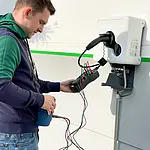









Bilingual Technical Support (EN / ES)
Public Service, Military and First Responder Discount
30 Day Return Policy
2 Year Warranty
Free Standard Shipping (US)
| Functions | |
| PE test (protective conductor) | available, error |
| PP simulation (charging cable coding) | open, 13 A, 20 A, 32 A, 63 A |
| CP simulation (communication line) |
A, B, C, D, error |
| Outputs (only for test purposes) | |
| Measuring connections | L1, L2, L3, N, PE |
| max. 250 / 430 V AC, 10 A | |
| laboratory plug | |
| Schuko connection | max. 250 V AC, 10 A |
| Fuse from the Schuko connection | fuse F 10 A / 250 V, 5 x 20 mm / 0.19 x 0.78" |
| CP signal output | ± 12 V PWM |
| Further specifications | |
| Input voltage | 1 phase: 250 V AC / 3 phase 430 V AC, |
| 50 / 60 Hz, max. 10 A | |
| Charging cable connector Type 1 | AC charging mode 3, compatible with IEC62196-1 |
| Type 1 or SAE J1772 with vehicle connection | |
| (Type 1, 5 pin, 1-phase) | |
| Charging cable connector Type 2 | AC charging mode 3, compatible with IEC62196-2 |
| Type 1 or SAE J1772 with vehicle connection | |
| (Type 2, 7 pin, 3-phase) | |
| Measurement category | CAT II 300 V |
| Protection class | IP54 |
| Pollution degree | 2 |
| Operating conditions | 0 ... 40 °C / 32 ... 104 °F, 10 ... 85% RH, non-condensing |
| Storage conditions | -10 ... 50 °C / 14 ... 122 °F, 10 ... 60% RH, non-condensing |
| Maximum working height | max. 2000 m / 6561 ft |
| Dimensions (handheld only) | 277 x 109 x 63 mm / 10.9 x 4.3 x 2.4" |
| Weight | ca. 1 kg / 2.2 lb |